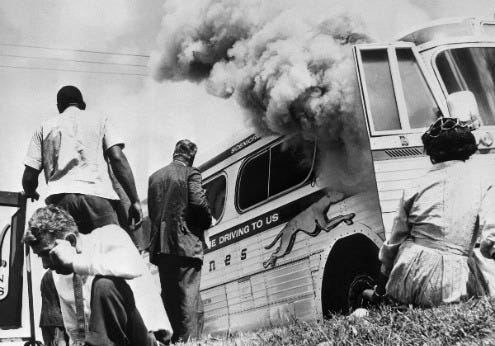Freedom Riders

Click here for showtimes for "Freedom Riders"
I admit when I first slipped the DVD for "Freedom Riders" into my video player, I did so without much enthusiasm. A documentary about the Freedom Riders, a critical watershed of the civil rights movement, when hundreds of young people rode buses to end segregation in the deep South?
This was well-traveled territory, I thought, and girded myself for a hagiographic paean to musty historical heroes.
From just a few minutes in, I knew how foolish I'd been. Director/writer Stanley Nelson's exhaustive, exhilirating portrait of those terrible events crystallizes a moment in the grand American experiment with stunning clarity and power.
I learned things about the Freedom Riders, civil rights icons and government figures I never knew before -- often right from the mouths of those who lived these events.
The film rightly highlights the bravery of these young people, most of whom were college students who put their educations on hold to risk abuse, arrest and even death in the name of racial equality.
But it also casts a sober, searching eye on all parties involved, finding self-aggrandizement and pettiness among those fighting for civil rights, and even some nobility among the backward Southern stalwarts dedicated to preserving the rigid past.
For example, I had no idea that the Freedom Riders was the idea of the Congress of Racial Equality, or CORE, an offshoot of the civil rights movement that envied the high profile of Dr. Martin Luther King Jr. and the NAACP. The mainstream groups, including King, actively dissuaded the riders from going into Alabama, and only jumped on the wagon when it became a media sensation.
"They were really courting violence to attract publicity that would forward the cause," said Julian Bond, former NAACP chairman.
John Seigenthaler, an assistant to Attorney General Robert Kennedy, relates that civil rights was far down the list of priorities for Bobby and the president, who were more concerned with foreign affairs. They actively sought out the support of segregation proponants during the 1960 election, including Alabama Gov. John Patterson.
Patterson himself is a key figure in the interviews, whose now-grandfatherly visage is at odds with the crafty politician of the day who played the various sides against each other. Patterson labeled the Freedom Riders "agitators" who were coming to Birmingham and Mobile to stir up violence -- without ever noting that it was the citizens of his state who instigated the brutality, not the riders committed to non-violent resistance.
In fact, I was stunned to learn that the Riders even went through training sessions in which actors cursed and slapped them during mock encounters. This footage is simply riveting.
One unheralded hero who emerges is Floyd Mann, the director of public safety for Alabama. At a critical juncture when Bobby Kennedy was threatening to send in national troops to guard the Riders, Gov. Patterson insisted that he could not protect all these "agitators," and publicly turned to Mann for affirmation.
Mann insisted that if ordered to protect them, he would do so, which effectively deflated Patterson's position, leading him to declare martial law in Mobile to protect a church full of 1,500 riders and other civil rights figures, including King and Ralph Abernathy.
The Riders, who had already endured arrest and beatings from the mob, begged King to join them on their journey -- and were refused. It's a stunning moment when these same men and women talk about losing a lot of respect for the revered civil rights icon that day, even going so far as to mock him as "Da Lord."
There are many more surprises and astounding tales to be gleaned from this stupendous film, which takes a history we thought we knew backward and forward, and gives it an electrified new life.
5 Yaps



